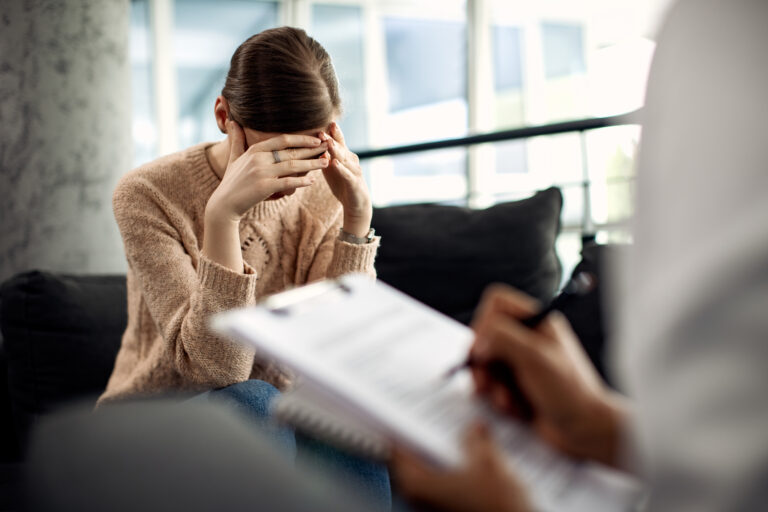Good mental health means being generally able to think, feel, and react in the ways that you need and want to live your life. Mental wellbeing describes your mental state, including how you are feeling and how well you can cope with day-to-day life. Our mental wellbeing is dynamic.
Types of Mental Health Conditions:
- Anxiety
- Depression
- Eating problems
- Schizophrenia
- Phobias
- Obsessive-Compulsive Disorder
- Bipolar disorder
- Personality disorders
- PTSD
What are mental health problems?
Mental health problems can affect any of us irrespective of age, personality, or background. They include a wide range of experiences and can affect the way people think, feel, or behave. They can appear as a result of experiences in both our personal and working lives, or they can come about without any easily identifiable cause. Some problems may be mild or moderate, while others may take on a more severe form, affecting a person’s ability to cope with day-to-day living.
Your mental wellbeing can be affected by work-related factors like:
- Repeated exposure to traumatic events
- Workload pressures
- Lone working
- Long working hours
- Shift work
- Dealing with people who may be physically or verbally abusive
Your mental wellbeing can also be affected by other things in your life, for example, if you:
- Suffer some sort of loss
- Experience loneliness
- Have relationship problems
- Are worried about money
Sometimes, there is no clear reason why we experience a period of poor mental health. It’s important to look after your mental wellbeing on a day-to-day basis, and not just after experiencing big traumatic events. Staying mentally well by building resilience can reduce your chances of developing mental health problems like depression, anxiety, and post-traumatic stress disorder.
How can one look after your well-being?
- Keep physically active: Regular exercise can be very effective in lifting your mood and increasing your energy levels. It doesn’t have to be very strenuous or sporty to be effective. The important thing is to pick something you enjoy doing, so you’re more likely to stick with it.
- Identify mood triggers: Keeping track of your moods in a mood diary can help you work out what affects your mental wellbeing and recognise changes in your mood that would be difficult to spot otherwise. For example, you may realise that seeing a certain person has an effect on your mood. Knowing what affects your moods can help you take steps to avoid these situations or mitigate against the negative impact a certain situation may have on you.
- Sleep: There is a close relationship between sleep and mental health. If you’re finding it difficult to sleep, don’t try to force it. Get up, go to another room, and try to relax there. Do something soothing, such as listening to music, until you’re tired enough to go back to bed. If you are awake for long periods, repeat this process as many times as you need to.
- Relax: It is important to make time for yourself and relax. In order to look after others you need to first care for yourself. Self-care is not self-indulgent, it’s essential. Do something you like, or even just take a five-minute break to look out of the window. Learning a relaxation technique, such as yoga, meditation or mindfulness can also help you relax and reduce stress levels.
- Diet: Explore the relationship between the food you eat and your mood. Improving your diet can help give you positive feelings, clearer thinking, more energy and calmer moods. Think about how regularly you eat. If your blood sugar drops, you might feel tired, irritable, and experience low mood. You need to eat regularly to keep your sugar level steady and choose foods that release energy slowly, like protein, nuts and seeds, oats, and whole grains.
Are you having too much caffeine? Caffeine is a stimulant. Having too much can make you feel anxious and experience low mood, disturb your sleep, or give you withdrawal symptoms if you stop suddenly. Caffeine is found in tea, coffee, chocolate, cola and other manufactured energy drinks. You might feel noticeably better quite quickly if you drink less caffeine or avoid it altogether.
- Accept yourself: One of the most important steps in maintaining mental wellbeing is to learn to accept yourself. If you value yourself, you are more likely to have positive relationships with other people and find it easier to cope with difficult times in your life.
- Use self-help books and websites to help you change your beliefs
- Be assertive
- Spend time with supportive people
- Try not to compare yourself to other people
- Acknowledge your positive qualities and things you are good at
- Learn to identify and challengeunhelpful thinking patterns
- Engage in hobbies that you enjoy
- Be realistic.




